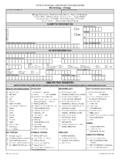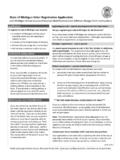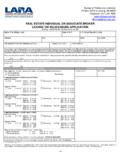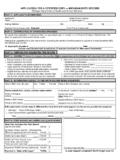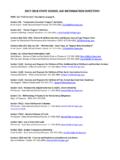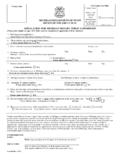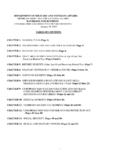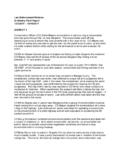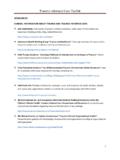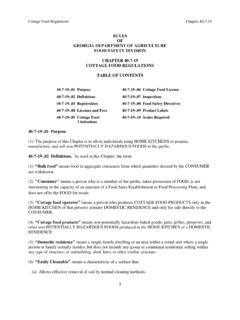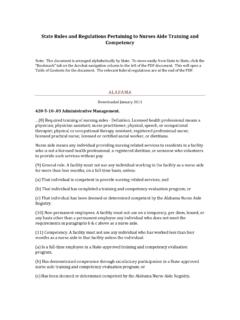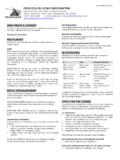Transcription of Food Safety, Licensing, and Labeling Regulations
1 Chapter Five: food Safety, Licensing, and Labeling RegulationsGrowing Michigan s Future Safety, Licensing, and Labeling RegulationsOverview .. and Regulation Requirements .. State and Local Regulations .. General Licensing and food Safety Guidelines .. Processed food Pet Treats and Animal Feed .. Processed food The Michigan Business One Stop .. Weights and Measures .. Resources for Licensing and Regulation food Safety Guidelines and Standards .. Planning for food Federal food Safety Initiatives .. food Safety Liability and Farm Insurances.
2 food Liability and Farm Insurance Regulatory Requirements by Product and Licensing Requirements for Nursery Stock, Christmas Trees, and Floriculture Products .. Christmas Tree Inspection and food Safety, Licensing, and Labeling RegulationsOverviewWhen planning to raise farm products or process foods for sale, you need to know and understand a variety of issues and meet state, local and federal requirements for licensing, Labeling and safe handling of food products. State requirements that affect food marketers may include inspection of processing facilities, plan review, review of labels on packaged products, inspection of scales, and collection of food samples to be analyzed for contaminants or to determine if ingredient labels are correct.
3 MDARD s food and dairy inspectors may also visit food businesses in response to consumer safety must be considered throughout the process, from the farm to post-harvest handling, processing, packaging and distribution. Rules and Regulations , including licensing and Labeling standards, are designed to help you present safe food products for public consumption. They can also impact your decision on what products you choose to market, based on the planning and preparation required to start your and Regulation RequirementsFood marketers must be familiar with, and comply with, local, state and federal food laws.
4 In general, the more foods are processed, the more they are regulated. Raw, unprocessed foods, single ingredient foods, shelf-stable foods, and products sold in small volumes or directly to the end consumer face specific Regulations . Foods that are processed, have multiple ingredients, are sold in large volumes, or sold at a location off the farm, to a retailer for sale to consumers, may have more regulatory requirements. The information below gives a general outline of Regulations . For specific Regulations by product or market, see the chart at the end of this chapter.
5 For regulatory issues specific to your business, it is always recommended to work directly with an inspector. For compliance assistance with state food regulatory requirements, contact MDARD s food and Dairy Division, at 800-292-3939. You will be connected with an inspector that covers your area of the state. Chapter Five: food Safety, Licensing, and Labeling RegulationsGrowing Michigan s Future and Local RegulationsMDARD is the lead state agency responsible for regulating food production, processing, and sales in Michigan, including licensing, Labeling , storage, recordkeeping, weights and measures, food advertising and trade practices, inspection, and food safety.
6 Local health departments also have regulatory responsibilities at food service facilities. Counties, townships, cities, and other local units of government may also have Regulations that apply to food businesses, including zoning and building code requirements. It is important to know, understand, and comply with all applicable federal, state, and local food regulatory requirements before you market your products. It is far better to work together with regulatory agencies early to avoid problems, rather than trying to fix things that were not properly done or permitted.
7 Local governments divide their responsibilities among departments, and the department names can vary among local units of government. Rural townships may have their own planning and zoning guidelines. It is best to check with your county, city, and/or township officials before proceeding on any farm/ food business development or expansion. To connect with the proper local official(s), check your county, city, and/or township s websites or the local government listings in your telephone Township Association has a listing of township governments and contact information at You can locate your county s website via the Michigan Association of Counties website at You can also access an alphabetical listing of Michigan cities, villages and townships and their website links at food Safety, Licensing, and Labeling RegulationsGeneral Licensing and food Safety GuidelinesFresh.
8 Uncut Raw Fruits and VegetablesFarmers are considered an approved source for raw and uncut fruits and vegetables they raise themselves. This exemption gives farmers the ability to sell their produce to consumers without a license. food safety starts in the field and continues through the process of harvesting, washing, packaging, storing, transporting and marketing fruits and vegetables. Even though no license is required, farmers are still required to take reasonable care to avoid contamination of their produce with disease organisms.
9 A food safety plan will help assure that your produce is safe and wholesome and will help you meet regulatory and buyer requirements expected as the food Safety Modernization Act of 2011 is implemented. EggsFarmers with fewer than 3,000 hens can sell eggs produced by their own flock directly to consumers or a first receiver without license. Farmers are required to be licensed if they have more than 3,000 hens, or if they are selling their eggs to a grocery store, food processing facility, restaurant, or food service facility. Eggs are a perishable product and must be handled properly to ensure food or Prepared FoodsYou must be licensed to sell processed or prepared foods.
10 This requires an approved facility separate from a home kitchen (unless your product and marketing situation falls under the Cottage food Law see Chapter Two). For some products, like sauces or pickles, the person in charge of processing may be required to take training courses in safe canning procedures and pH or PoultryGenerally, beef and other common meat animals must be slaughtered and processed under federal inspection. If you raise beef and have it processed at a licensed and federally-inspected facility, you can sell the processed product as long as you have an MDARD food Establishment License.
